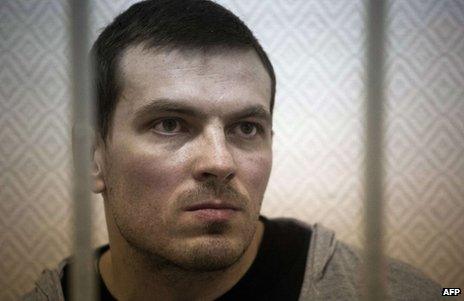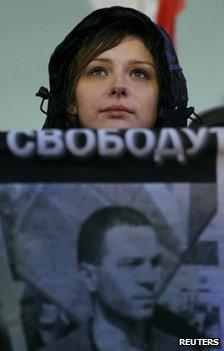Russia's anti-Putin detainees fight for justice
- Published

Maxim Luzyanin is the first of the 18 to have been convicted
The fate of 18 people arrested in Russia after anti-Putin protests in May has received little of the publicity given to the Pussy Riot trial.
The plight of the feminist punk band Pussy Riot, who dared to sing a crude anti-Putin song in Moscow's main cathedral, has become an international cause celebre. But away from the TV cameras the authorities have cracked down on dissent systematically.
Nikolai Lambin's wedding was scheduled for 12 May. It would be a cheap and simple ceremony. The young political activist from the Siberian city of Tyumen was travelling to the venue by bus. But what promised to be one of the happiest days in his life turned into a nightmare.
Mr Lambin says that as soon as he got off, four plainclothes policemen dragged him into a van. He says that once inside, he was heavily beaten and threatened with rape. Eventually, he agreed to sign a confession that he had been carrying heroin. He says the drugs were planted on him by the police during the ordeal.
He was then taken into a court, where it took only 15 minutes for the judge to rubberstamp the charges, based entirely on Mr Lambin's confession and statements by two police officers. The court released him on bail.
Mr Lambin's wedding took place a few days later and he is now awaiting trial. He believes his only "guilt" was that he had created a group on a Russian social network in support of protest marches in Moscow.
Local police say they did not find any wrongdoing by the officers, after a review of Mr Lambin's arrest undertaken at the request of his lawyers.
Hardly noticed by the media at the time, this incident turned out to be a prelude for a new wave of political repression, presented as a drive to maintain law and order.
Soon after Vladimir Putin's inauguration on 7 May, the authorities took on the opposition, which had rallied tens of thousands in Moscow street marches during the election period.
Mr Putin had famously dismissed the participants as Bandar-log - the unruly monkeys from Rudyard Kipling's Jungle Book. Opinion polls suggest that many Russians continue to support his tough methods.
Eighteen arrests
A massive opposition march on the eve of Mr Putin's inauguration ended with clashes and hundreds of arrests. All those detained were soon released, but a month later 18 of them were arrested again in surprise raids on their apartments.

Protesters have highlighted Vladimir Akimenkov's case and others at rallies
They were charged with assaulting police and participating in mass riots. Almost all of them appear to be rank-and-file activists or ordinary protesters.
They include students, scientists, a travel agent, a journalist, an electrician and even an ex-marine, who marched in front of Mr Putin during a Red Square parade just a year before.
"It is as if they were deliberately selected to represent different walks of life," a girlfriend of one of the captives told the BBC.
Some of the arrested were released on bail but most are still in jail. Many complain of mistreatment.
Left-wing activist Vladimir Akimenkov says he is rapidly losing his eyesight because of the lack of light in his prison.
His pleas for release on bail resulted in him being moved to a medical facility, where he says the conditions are worse than in the prison because of cold and damp.
He has still received no medical treatment. Prison authorities told Mr Akimenkov's lawyers that he would only qualify for release if he went totally blind.
Mr Akimenkov says it will not be long before that happens, and describes his ordeal as "torture".
'Not a riot'
The bulk of the evidence against the "rioters" that emerged during arrest hearings was based on testimonies by policemen who had clashed with the protesters. Human rights organisations are extremely sceptical.
"There was no mass riot, as defined by the Russian law - no armed violence, no cars torched, no looting, no pogroms," says Sergey Davidis of the Memorial human rights centre.
"On the contrary, it was the police who used excessive force and protesters defended themselves."
The authorities rejected all complaints about the conduct of police officers in the aftermath of the 6 May events.
Riot police clashed with demonstrators and dozens were arrested
Some of them were awarded with flats by the Moscow mayor for "preventing an act of provocation".
Mr Putin's press secretary, Dmitry Peskov, said at the time that police were "too soft on the protesters, who staged a long-expected act of provocation".
He was also quoted as saying by an MP that he wanted "their liver smeared on the tarmac", which he has never denied.
Travel agent Oleg Arkhipenkov was identified by one of the policemen as a person "who attempted to hit him" during the clashes.
He spent six weeks in prison and a week in a psychiatric clinic, subject to forced treatment, before the court released him on bail.
It emerged during the hearing that Mr Arkhipenkov had not been in the square where the clashes took place.
He was arrested at the same time near the venue of another protest action, in which he says he did not participate anyway. But despite his release, charges have not been dropped.
Two more suspects say they were nowhere near the scene during the clashes, as confirmed by their arrests at the other protest action.
Prosecutors want another suspect - Mikhail Kosyakin, who suffers from mild schizophrenia - to undergo forced treatment.
The plight of the 6 May prisoners was highlighted by the first sentence delivered in the case. Maxim Luzyanin, a restaurateur and gym-owner, was sentenced to four and a half years in prison after pleading guilty to all charges.
Many suspects say through their lawyers that investigators are trying to coerce them into testifying against the protest leaders, namely Alexei Navalny and Sergey Udaltsov.
The latter was formally charged with organising a riot but both men remain free.
Mr Navalny has been charged in an unrelated corruption case.
However, two of Mr Udaltsov's deputies are in jail. One of them, Leonid Razvozzhayev, disappeared from a UN office in Ukraine, where he was seeking political asylum.
He says he was kidnapped, smuggled across the border and tortured before ending up in a Moscow prison. Russian officials have said he handed himself in to them.
Vladimir Putin's re-election has brought plenty of reminders that the former secret police officer will not hesitate to isolate and neutralise his political opponents.
- Published30 November 2012
- Published26 October 2012
- Published6 May 2012